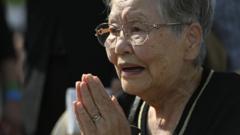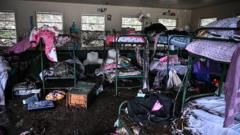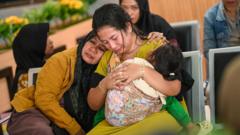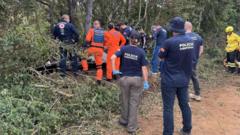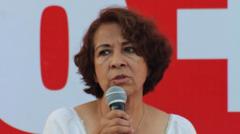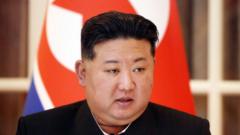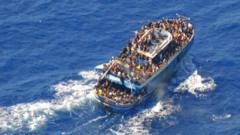As Nagasaki commemorates the 80th anniversary of the atomic bombing, Mayor Shiro Suzuki urges the world to reflect on ongoing conflicts and the threat of nuclear escalation. Survivors share their memories, advocating for peace and remembrance of the horrors of war.
Nagasaki Remembers: A Plea for Peace 80 Years Post Atomic Attack

Nagasaki Remembers: A Plea for Peace 80 Years Post Atomic Attack
In a poignant ceremony, Nagasaki's mayor calls for an end to global conflicts, warning against the perils of nuclear war on the 80th anniversary of the city's devastation from an atomic bomb.
On the 80th anniversary of the atomic bomb that obliterated Nagasaki, the city's mayor, Shiro Suzuki, fervently called for peace, reflecting on the urgent need to end conflicts that risk spiraling into nuclear warfare. During a solemn remembrance ceremony, Suzuki delivered a heartfelt Peace Declaration, imbued with a warning against the “vicious cycle of confrontation” that has intensified globally.
“Conflicts around the world are intensifying,” Suzuki lamented, emphasizing that the world is on a dangerous trajectory that could lead to more nuclear confrontations. The atomic bomb dropped on Nagasaki on August 9, 1945, claimed the lives of approximately 74,000 people, a tragedy that remains etched in the memories of survivors and the collective conscience of humanity. Financial devastation and suffering from radiation exposure continued long after the event, with many survivors battling severe health issues like leukemia.
This year’s commemoration followed the one held for Hiroshima, marking the dual tragedies inflicted by nuclear warfare. The ceremony included a moment of silence, a poignant tribute that underscored themes of peace and hope, as bells from Nagasaki’s twin cathedrals rung for the first time since the event to symbolize a collective message of peace.
As a moving tribute, water offerings were presented, reminiscent of the desperate pleas for water from victims amid the devastation. Participants from various generations, including survivors like 93-year-old Hiroshi Nishioka, who vividly recounted the horror and pain experienced after the attack, came together to remember the tragic events. Nishioka's testimony revealed the deep, invisible scars left by the atomic blast, even for those who were not physically harmed.
In an ongoing context of global warfare, including the conflicts in Ukraine and between Israel and Hamas, the mayor's plea echoed with a renewed urgency. Last year, Nagasaki faced criticism for excluding Israeli representatives from the ceremony, but invited delegations from Israel and Russia for this year’s event, aiming to foster dialogue in tumultuous times. Although the Treaty on the Prohibition of Nuclear Weapons came into force in 2021, nuclear powers continue to resist disarmament, emphasizing the chilling reality that these weapons persist as instruments of deterrence.
Nagasaki's anniversary serves not only as a reminder of past atrocities but as a call to action for peace and remembrance of the real, tangible tragedies that occur when humanity conflicts with itself.

